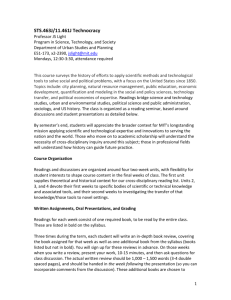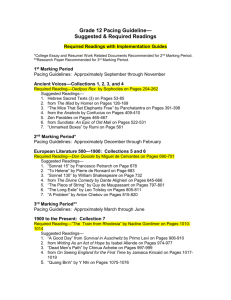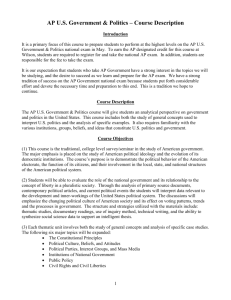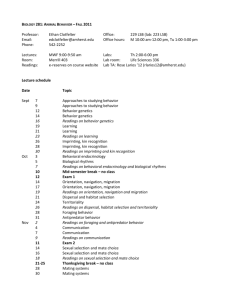Syllabus 2015-2016 Fall Term - Department of Political Science
advertisement
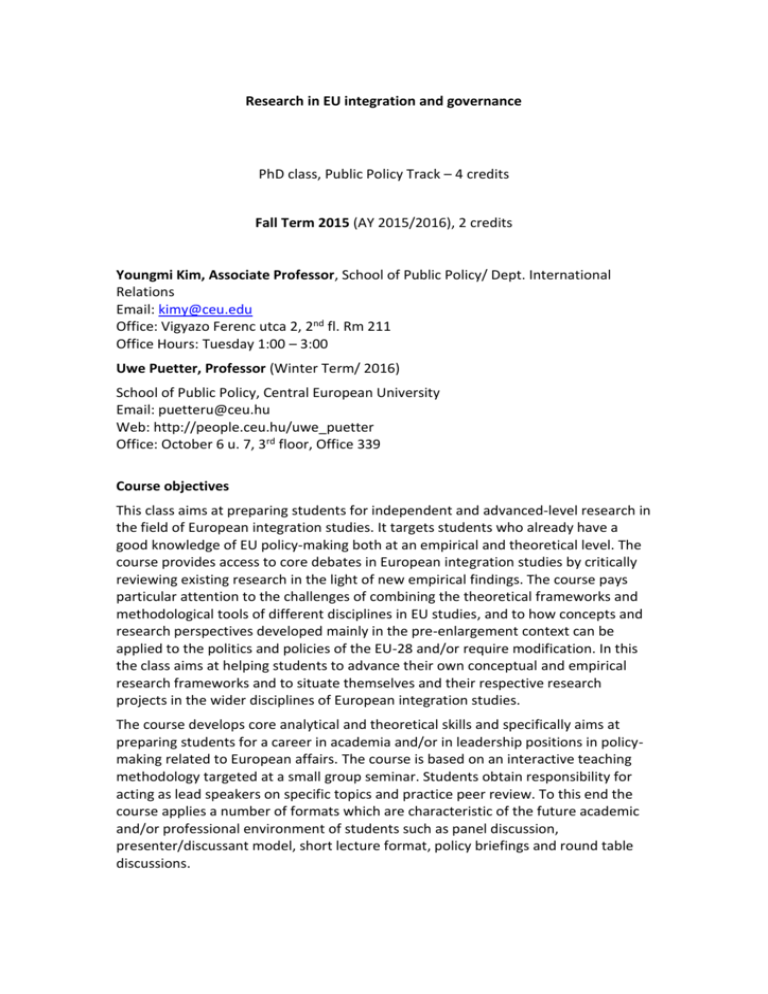
Research in EU integration and governance PhD class, Public Policy Track – 4 credits Fall Term 2015 (AY 2015/2016), 2 credits Youngmi Kim, Associate Professor, School of Public Policy/ Dept. International Relations Email: kimy@ceu.edu Office: Vigyazo Ferenc utca 2, 2nd fl. Rm 211 Office Hours: Tuesday 1:00 – 3:00 Uwe Puetter, Professor (Winter Term/ 2016) School of Public Policy, Central European University Email: puetteru@ceu.hu Web: http://people.ceu.hu/uwe_puetter Office: October 6 u. 7, 3rd floor, Office 339 Course objectives This class aims at preparing students for independent and advanced-level research in the field of European integration studies. It targets students who already have a good knowledge of EU policy-making both at an empirical and theoretical level. The course provides access to core debates in European integration studies by critically reviewing existing research in the light of new empirical findings. The course pays particular attention to the challenges of combining the theoretical frameworks and methodological tools of different disciplines in EU studies, and to how concepts and research perspectives developed mainly in the pre-enlargement context can be applied to the politics and policies of the EU-28 and/or require modification. In this the class aims at helping students to advance their own conceptual and empirical research frameworks and to situate themselves and their respective research projects in the wider disciplines of European integration studies. The course develops core analytical and theoretical skills and specifically aims at preparing students for a career in academia and/or in leadership positions in policymaking related to European affairs. The course is based on an interactive teaching methodology targeted at a small group seminar. Students obtain responsibility for acting as lead speakers on specific topics and practice peer review. To this end the course applies a number of formats which are characteristic of the future academic and/or professional environment of students such as panel discussion, presenter/discussant model, short lecture format, policy briefings and round table discussions. Learning outcomes At the outcome of this course students will have the ability to critically apply core theories and research perspectives in European integration theory to different empirical contexts in an innovative manner, thus contributing both to empirical and theoretical innovation. They will have developed an understanding of core conceptual, methodological as well as empirical challenges with regard to researching a range of different issues in contemporary EU governance and policy. Moreover, students will be able to apply a number of core academic practices and will have developed oral and written presentation skills which are required for communicating the results of complex and advanced-level studies to different audiences (academic, professional expert setting, interested public). This course will contribute to the development of a new generation of researchers with a strong analytical potential, thus helping innovation in the field of European integration studies both in research and teaching. Those students aiming for a career in EU policy practice will be able to both produce and make use of complex theoretical and empirical studies in applied and practical contexts. Teaching schedule Tuesdays: 3:30- 5:10pm Session format Each session is fully based on students’ presentation and discussions. All participants are required to read core readings. Course requirements Final Paper 50 % (3000 words, Deadline 15th December) Presentations 30 % Participation and discussion 20% Readings for this class All readings for this course are available through the CEU library. Most readings are available in electronic format. This includes book chapters. You can access the library’s e-book holding by visiting the relevant bibliographic entry of the publication in the main library catalogue. You need to be on campus or connect via VPN to the CEU network. Do note that most publications by Oxford University Press are available via the www.oxfordscholarship.com database, which is part of the CEU library connection. Students can also access most readings via the course website (see below). Access to the course website on CEU e-learning For accessing the course website on the CEU e-learning platform you will need an enrolment key which you can request from the course director. The direct link to the course website is http://ceulearning.ceu.hu/course/view.php?id=3703 Literature As a PhD course, this class builds on active participation and the research interests of its members. The selection of readings is not limited to the suggestions which appear in the course outline. The reading list will be discussed and revised in regular intervals. Required readings are posted on the e-learning platform (http://ceulearning.ceu.hu/). Please check it each time before you prepare for individual classes! Materials will be made available through the e-learning platform or can be found through the online resources of the CEU library. In order to facilitate access to frequently used hardcopies of books from the CEU library a special book collection has been created for this class in the CEU library. There are no compulsory textbooks for this class as we deal with a wide range of research topics and participants are expected to have previously studied the EU policy-making context. Familiarity with core issues in European integration research, concepts and theories as well as the EU’s institutional architecture is required. Five reference textbooks have been selected below, each representing state-of-the art knowledge in a specific area of EU integration studies. A list of the most commonly cited journals is provided as well. Please check them out regularly. Reference post-graduate textbooks (do note the year of publication) Hix, S., Høyland, B., The political system of the European Union, (Houndmills, Basingstoke: Palgrave Macmillan), 2011. Peterson, J., Shackleton, M. (eds.), The institutions of the European Union, (Oxford: Oxford University Press), 2012. Wiener, A. and T. Diez, European integration theory, (Oxford: Oxford University Press), 2009. Craig, P. and De Búrca, G., European Union Law: Texts, Cases and Materials, (Oxford: Oxford University Press), 2011. Reference advanced undergraduate textbooks (do note the year of publication) Cini, M. and Pérez-Solórzano Borragán, N. (eds.), European Union Politics, (Oxford: Oxford University Press), 2013. Zimmermann, H./ Dür, A. (eds.), Key controversies in European integration, (Houndmills, Basingstoke: Palgrave Macmillan), 2012. Journals (all available at CEU) Comparative European Politics European Political Science Review European Union Politics Journal of Common Market Studies Journal of European Integration Journal of European Public Policy European Law Journal European Law Review Common Market Law Review 1 Introduction and course overview. From the European Community to the European Union Core readings J.T.S. Keeler (2005) Mapping EU Studies: The Evolution from Boutique to Boom Field 1960-2001. Journal of Common Market Studies 43(3), 551-582. J. McCormick (2005) Understanding the European Union. A Concise Introduction (Palgrave), 57-86. Additional readings M. Burgess (2006) Federalism and the European Union: The building of Europe 19502000 (Routledge). T. Judt (2005) Postwar: A History of Europe since 1945 (Penguin) T. Padoa-Schioppa (2000) The road to Monetary Union in Europe: The emperor, the kings, the genies. (Oxford: OUP). Stanley Hoffmann. 1966. “Obstinate or Obsolete? The Fate of the Nation State and the Case of Western Europe.” Daedalus 95: 892-908. S. Bulmer (2009) ‘Institutional and Policy Analysis in the European Union: From the Treaty of Rome to the Present’, in D. Phinnemore and A. Warleigh-Lack (eds) Reflections on European Integration: 50 Years of the Treaty of Rome (Palgrave). G. Soros (2012) The Tragedy of the European Union and How to Resolve It New York Review of Books, 27 September. G. Soros and G.P. Schmitz (2014) The Future of Europe: An Interview with George Soros. New York Review of Books. 24 April. 2 History: From Maastricht to The Lisbon Treaty and beyond. Promise and crisis of the EU Core readings A. Moravcsik and K. Nicolaides (1999) Explaining the Treaty of Amsterdam: Interests, Influences, Institutions. Journal of Common Market Studies, 37, 59-85. S. Bulmer and W. Paterson (2013) Germany as the EU’s reluctant hegemon? Of Economic strength and political constraints. Journal of European Public Policy, 20(10), 1387-405. Additional readings S. Hix (2008) What’s wrong with the European Union and How to fix it (Polity). T. Christiansen and C. Reh (2009) Constitutionalizing the European Union (Palgrave) 3 Theories 1 – European integration Core readings D. Ioannou, P. Leblond, A Niemann (2015) European integration and the crisis: practice and theory. Journal of European Public Policy, 22(2), 155-176. K. Mitchell (2014) Does European identification increase support for further economic integration? Journal of European Integration, 36(6), 601-618. Additional readings S. Hix (1994) The Study of the European Community: The Challenge to Comparative Politics. West European Politics, 17, 1-30. R. Adler-Nissen, K. Kropp (2015) A sociology of knowledge approach to European integration: Four Analytical Principles. Journal of European Integration, 37(@), 155173. P. Pierson (1996) The path to European integration: a historical institutionalist analysis. Comparative Political Studies, 29(2), 123-63. P. Drulak, R. Drulakova (2014) The richness of the liberal tradition in international relations: Karl Deutsch on political community and the European integration. International Relations, 28(3), 333-349. J. Bolstad (2015) Dynamics of European integration: Public Opinion in the Core and the Periphery. European Union Politics, 16(1), 23-44. H. Wallace (2010) ‘An institutional anatomy and five policy modes’, in H Wallace, M.A. Pollack, and A.R. Young (eds) Policy-making in the European Union (Oxford: OUP). 4 Theories 2 – EU governance Core readings B. Kohler-Koch and B. Ritterberger (2006) The governance turn in EU Studies. Journal of Common Market Studies, 44, 27-49. J. Langbein (2014) European Union Governance towards the Eastern Neighbourhood: Transcending or Redrawing Europe's East-West Divide? Journal of Common Market Studies. 52(1), 157-174. Additional readings L. Hooghe and G. Marks (2004) Multi-level Governance and European Integration (Rowman and Littlefield) Ian Bache and Matthew Flinders eds. 2004. Multi-Level Governance. Oxford: Oxford University Press. Liesbet Hooghe and Gary Marks. 2001. Multilevel Governance and European Integration. Rowman and Littlefield. I. Manners (2007) ‘Another Europe is possible’, in K. E. Jorgensen, M. Pollack and B. Rosamond (eds) Handbook of European Union Politics (SAGE). 5 Institutions and governance 1 Institutional architecture and institutional change (The European Commission/ The European Council and the Council of Ministers) Core readings D. Dinan, (2014) Governance and Institutions: The Unrelenting Rise of the European Parliament. Journal of Common Market Studies, 52, 109-124. B. Rosamond (2015) Performing Theory/theorizing performance in emergent supranational governance: The ‘live’ knowledge archive of European integration and the early European Commission. Journal of European Integration, 37(2), 175-191. Additional readings M. Parízek, M.O. Hosli, B. Plechanovová (2015) Avoiding Paralysis: The Eastern Enlargement and the Council of the European Union. Journal of European Integration, 37(6), 649-665. F.M. Häge (2007) Committee decision-making in the Council of the European Union. European Union Politics, 8(3), 299-328. J. Golub (2012) How the European Union does not work: National bargaining success in the Council of Ministers’. Journal of Common Market Studies, 45(1), 45-66. J. Peterson (2008) Enlargement, reform, and the European Commission: weathering a perfect storm? Journal of European Public Policy, 15(5), 761-80. M. Tsakatika (2005) The European Commission between Continuity and Change. Journal of Common Market Studies, 43(1), 193-220. Pollack, Mark A. 1997. “Delegation, Agency, and Agenda-Setting in the European Community.” International Organization 51(1): 99-134 (Winter). Schmidt, Susanne. 2000. “Only an Agenda Setter? The European Commission’s Power over the Council of Ministers.” European Union Politics 1(1): 37-61 Mattila, Mikko and Jan-Erik Lane. 2001. “Why Unanimity in the Council? A Roll Call Analysis of Council Voting.” European Union Politics 2(1): 31-52. Schure, Paul and Amy Verdun. 2008. “Legislative Bargaining in the European Union: The Divide between Large and Small Member States.” European Union Politics 9(4), 459-486. J. Tallberg (2004) The Power of the Presidency: Brokerage, Efficiency and Distribution in EU Negotiations. Journal of Common Market Studies 42(5), 999-1022. 6 Institutions and governance 2 Institutional architecture and institutional change (The European Parliament/ The Eurogroup/ The European Central Bank) Core readings T. Winzen (2015) Parliamentary co-evolution: national parliamentary reactions to the empowerment of the European Parliament. Journal of European Public Policy, 22(1), 75-93. Additional readings Hix, Simon, Abdul Noury, and Gérard Roland. 2006. “Dimensions of Politics in the European Parliament.” American Journal of Political Science 50(2): 494- 511. Hausemer, Pierre (2006) Participation and Political Competition in Committee Report Allocation: Under What Conditions Do MEPs Represent Their Constituents? European Union Politics 7(4): 505-530. M. Egan (2012) ‘Single Market’, in E. Jones, A. Menon, S. Weatherhill (eds) Oxford Handbook of the European Union (Oxford: OUP). J. Peterson (2004) ‘Policy networks’, in A. Wiener and T. Diez (eds) European Integration Theory (Oxford: OUP). B. Kohler-Koch (2009) The three worlds of European civil society – What role for civil society for what kind of Europe? Policy and Society, 28(1) 47-57. 7 Reading Week 8 Policies and policy-making in the EU: The Environment Core readings Puetter, U. (2012), 'Europe's deliberative intergovernmentalism - the role of the Council and European Council in EU economic governance', Journal of European Public Policy, 19 (2), 161-178. J. Vogler (2005) The European contribution to global environmental governance. International Affairs, 81(4), 835-49. Additional readings M. Schreurs and Y. Tiberghien (2007) Multilevel reinforcement: explaining European Union Leadership in Cimate Change Mitigation. Global Environmental Politics, 7(4), 113-37. S. Oberthür, Sebastian, F. Rabitz, Florian (2014) On the EU's performance and leadership in global environmental governance: the case of the Nagoya Protocol. Journal of European Public Policy. 21(1), 39-57. D. Belis, S. Schunz (2013) China and the European Union: Emerging Partners in Global Climate Governance? Environmental Practice, 15(3), 190-200. A Carpenter (2012) The Role of the European Union as a Global Player in Environmental Governance. Journal of Contemporary European Research, 8(2), 167172. 9 Policies 2: Enlargement Should Ukraine and Turkey become an EU member? How far to the East should the EU go? Core readings Hobolt, Sara B. (2014) Ever closer or ever wider? Public attitudes towards further enlargement and integration in the European Union. Journal of European Public Policy. 21(5), 664-680. J. O’Brennan (2014) On the Slow Train to Nowhere?' The European Union, 'Enlargement Fatigue' and the Western Balkans. European Foreign Affairs Review. 19, 221-241. Additional readings R.D. Kelemen, A. Menon, J. Slapin (2014) Wider and deeper? Enlargement and integration in the European Union. Journal of European Public Policy. 21(5), 647663. M. Carbone (2007) The European Union and International Development: The Politics of Foreign Aid (Routledge) F. Soderbaum and P. Stalgren (eds) (2009) The European Union and the Global South (Lynne Rienner). 10 Issues 1: Democratic Deficit and Populisms Core readings K. Nicolaidis, R. Youngs (2014) Europe's democracy trilemma. International Affairs, 90(6), 1403-1419. A. Hurrelmann (2014) Democracy beyond the State: Insights from the European Union. Political Science Quarterly, 129(1), 87-105. H. Bang, M. Jensen, P. Nedergaard, (2015) ‘We the People’ versus ‘We the Heads of States’: the debate on the democratic deficit of the European Union. Policy Studies, 36(2), 196-216. Additional readings W. Outhwaite (2014) The future of European democracy. European Journal of Social Theory. 17(3), 326-342. M. Goodhart (2007) Europe’s Democratic Deficits through the Looking Glass: The European Union as a Challenge for Democracy, Perspectives on Politics 5(3): 567-584. V. Schmidt (2005) Democracy in Europe: The Impact of European Integration. Perspectives on Politics 3(4): 761-779. M., Bartl (2015) The Way We Do Europe: Subsidiarity and the Substantive Democratic Deficit. European Law Journal, 21(1), 23-43. D. Innerarity (2014) What kind of deficit?: Problems of legitimacy in the European Union. European Journal of Social Theory. 17(3), 307-325. 11 Issues 2: Europe in Crisis? The EU and the Eurozone Core readings T. Kuhn and F. Stoeckl (2014) When European integration becomes costly: The Euro crisis and public support for European economic governance. Journal of European Public Policy. D. Hodson (2014) Eurozone Governance: Recovery, Reticence and Reform. Journal of Common Market Studies. 52, 186-201. Additional readings E. Nowotny (2014) The Future of European Monetary Integration. Atlantic Economic Conference, 42, 229-242. C. Holmes (2014) ‘Whatever it takes’: Polanyian perspectives on the Eurozone crisis and the gold standard. Economy and Society, 43(4), 582-602. 12 Academic practice seminar: Textbooks in European Studies Presenters will review of major textbook used as a teaching resource in degree programs focusing on EU studies. What are core textbooks suitable for either the BA and MA level or both? What are key book series and publishers relevant to the field? What other sources will you use for teaching (official, unofficial, academic, nonacademic, media)? The syllabus for the winter term to be followed in the next page:
